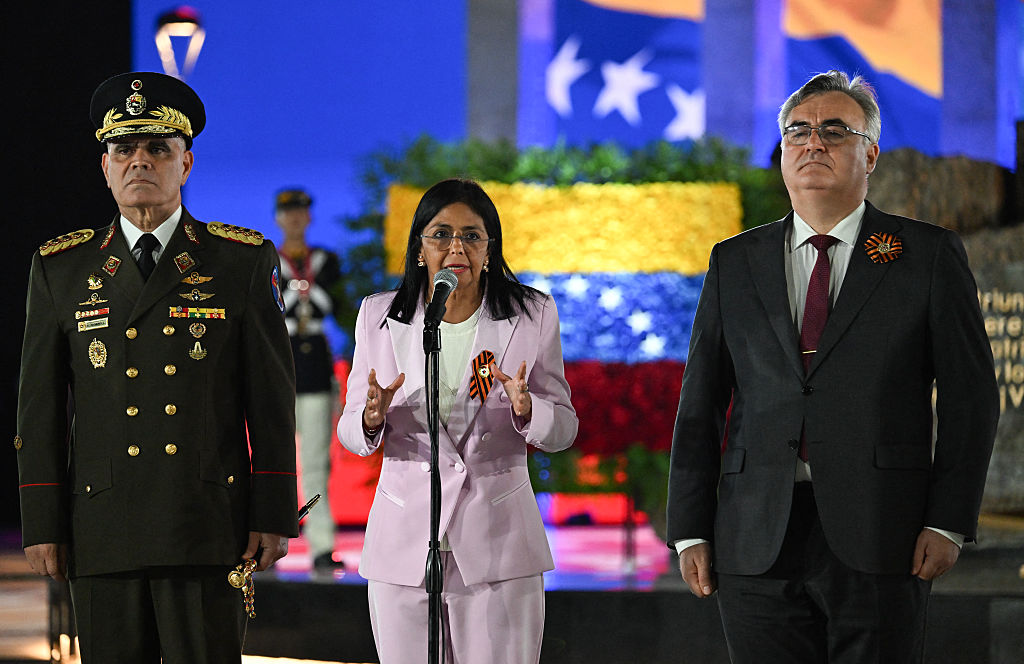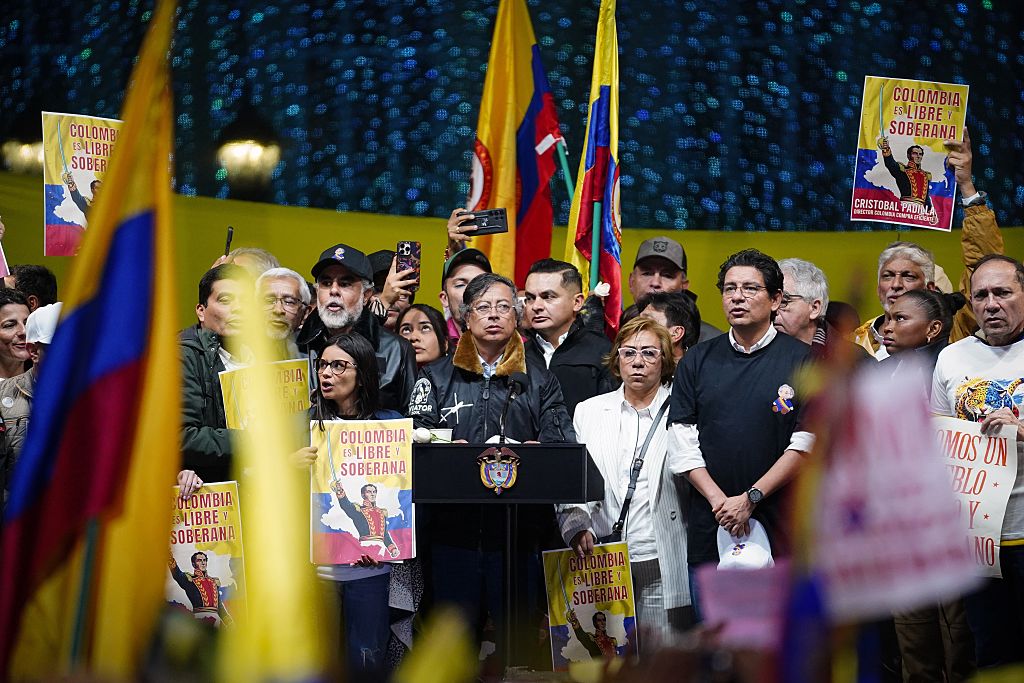Interview: OAS Secretary General Insulza on the Promise of the Fifth Summit
Interview: OAS Secretary General Insulza on the Promise of the Fifth Summit
OAS Secretary-General José Miguel Insulza joined AS/COA Online for an interview about the recent Summit of the Americas, from negotiating mandates to carrying them out at June's General Assembly in Honduras. He also offered his view on the process for Cuba to rejoin the OAS.
Secretary-General of the Organization of American States (OAS) José Miguel Insulza joined AS/COA Online’s Carin Zissis for an exclusive interview about the recent Summit of the Americas, from the process of negotiating hemispheric mandates to the upcoming OAS General Assembly. Insulza also talks about his position on a 1962 resolution that ejected Havana as an OAS member state: “Everybody says that if we repeal the resolution that means that the next day Cuba is back in the OAS. I don’t think that’s what anybody wants, starting with Cuba.”
AS/COA Online: Let's talk about the recent Summit of the Americas in Trinidad and Tobago. While progress was made during the summit, there has been a lot of discussion around the process of creating and approving the declaration.
Insulza: Actually, I think that a practice was used that has not been used in the Inter-American system before. Several institutions—for example the Non-Aligned Movement—make decisions by consensus, which means everybody has to agree or, if they disagree, not veto the declaration. And that’s exactly what happened this time. The chairman of the meeting [Prime Minister Patrick manning of Trinidad and Tobago] asked for consensus and some of the leaders said they disagreed with parts of the declaration but they would not stop the declaration from being issued. So the declaration is perfectly legal and it was issued with the signature of the chairman, as usually happens.
AS/COA Online: There has also been criticism of the declaration encompassing so many different areas.
Insulza: That’s the problem, and I agree with that. You have 96 or 97 paragraphs and negotiators go through a process of about eight months of creating the document. In the end the leaders, who were the ones that appoint the negotiators, begin looking at it and ask, “Oh, no, what’s this in paragraph 73?” or “I don’t agree this charging the secretary-general of the OAS with this,” or “What happened with paragraph 50? I don’t want to give a blank check for new technologies and renewable energies, I really had other priorities.” They have to be told, “Look, Mr. President, this was negotiated, so in exchange for approving paragraph something, we are approving these other ones.” It is like a synthesis.
As Prime Minister Manning said, “Not everybody agrees with everything that the declaration says.” The problem was that when he said this, everybody agreed, but some leaders had already gone on record saying they were not going to sign. But they didn’t want to stop the process either. So they suggested the procedure of consensus, saying, “Okay, why don’t we agree on this issue in the declaration, the prime minister will sign it, it is an official declaration of the summit, but we are not going to go to a public ceremony to sign it.” Which is fine because they said five years ago that they were not going to do it.
AS/COA Online: Do you think that will shape the process in future summits?
Insulza: It has happened before. It’s not really well known, but there have been some cases in which some leaders have said, “Look, I don’t agree with this and that, but I won’t object.” This time there was only one footnote. The Bolivian footnote covers biofuels, and they registered the complaint with a note. Actually, the others could have done the same but they opted for this other way out, which is perfectly normal.
AS/COA Online: A great deal of attention was given to President Barack Obama, as this was his first meeting with hemispheric leaders. What happened on the sidelines that, in your perspective, did not receive adequate coverage?
Insulza: I think there were three important results at the summit. One is the declaration, which even though it’s incomplete and not fully acceptable for everybody involves a number of mandates that we have to carry out. And this time they are very precise. There are around 44 mandates, but about 10 or 12 are priorities. In a couple of years we are going to be able to know if we completed them or not. Did we set in motion a network for human development? Did we start the new project for energy? Did every country ratify the Convention on Illicit Manufacturing and Trafficking in Firearms? So they were very precise in this case.
Second, I think that the declaration was complemented by the statement of Prime Minister Manning, especially on three issues that some leaders gave him as reasons for their unwillingness to sign. One was the fact that the crisis was not included because, after all, the crisis was much more recent than the discussion of the declaration. So there’s long paragraphs in his statement on the crisis. I sincerely hope that the big push we tried to give to the financial and multilateral institutions such as the Inter-American Development Bank will end positively. I think that every country was concerned about the crisis; every country was concerned about how they were going to face the crisis. Everybody felt that the G20 summit had been a good step forward, but they wanted to know how they were going to be included, and the idea of handling it through multilateral institutions and trying to give more funding and more resources to those multilateral institutions was very relevant. Then there was also Cuba and Haiti. Those were charged to us and we have to deal with related issues in the near future. We will try to do it as best as possible.
Number three was President Obama. Some might say that he was number one, because many of the things could not have happened if he had not adopted the attitude he adopted. Everybody took him seriously when he said a few weeks before, “I want to create a policy with you, not for you.” They were willing to give him a chance because of that.
So the summit involves a big, clear promise and we hope that we can live up to it.
AS/COA Online: You have been vocal in saying that you’d like to see Cuba in the OAS. What are some of the steps you think need to be taken?
Insulza: I’ve been very vocal on the first step. Not on the whole process because your question shows me again that probably there’s one thing that has been misunderstood and all the press says the same thing. I’ve been very vocal in saying that we must repeal Resolution VI of 1962. It’s an old resolution, it’s not valid anymore, and it doesn’t condemn Cuba for not being democratic. It condemns it for being a member of the Sino-Soviet axis and says that this axis is aggressive against the United States. But it doesn’t exist anymore. The Sino-Soviet axis disappeared about four or five years after Cuba’s suspension. The Soviet Union disappeared almost 20 years ago and the Chinese are even friends with the United States today, so it’s really crazy. It is a piece of the Cold War that was left in a corner and we must get rid of it.
Now, what happens then, that’s the process we have to see about. I am not implying that the next day Cuba is going to sit again in a chair at the OAS after 48 years. There’s a lot of dialogue that needs to take place. So I have been very specific and vocal about repealing the resolution, but I leave the rest of the process to the [Permanent] Council of the General Assembly to decide. Maybe we will ask the Inter-American Juridical Committee to issue a report according to what steps should be followed, maybe we will do it in the Council—I don’t know. But the first thing that I would like to see is the repeal of the Resolution of 1962.
AS/COA Online: Do you think that there’s a natural step that will occur after that?
Insulza: I don’t think so. That’s precisely the issue. Everybody says that if we repeal the resolution that means that the next day Cuba is back in the OAS. I don’t think that’s what anybody wants, starting with Cuba. There are lots of things other countries want to talk about; they are concerned about the Inter-American Democratic Charter, [which requires OAS member states to be democratic.] So it would be a dialogue and things will be happening and some people have said that Cuba will probably start attending some meetings. We will go step by step. But of course, I understand that some countries are maybe concerned that, from one day to the next, the world would change. Let me tell you, I am not very concerned about that, because I don’t think that it will happen that way.
AS/COA Online: Moving onto another topic, the OAS General Assembly is coming up in June.
Insulza: Yes, in San Pedro Sula on June 2.
AS/COA Online: What will some of the top agenda items be?
Insulza: As always, the first assembly after the summit is the implementation of the summit’s mandates. For example, the summit of 2001 was in Quebec City. The assembly was devoted basically to discussing the Inter-American Democratic Charter, which was signed four or five months later.
I think that, this time, in addition to the issues from the summit, there’s willingness from the Honduran government to stress what they call the culture of non-violence and facing the broader problem of violence in the region. I think it will be a main topic. Of course, Cuba and Haiti will be subjects, because we have a mandate to discuss them.
AS/COA Online: Talking about public safety, I was wondering what sort of progress being made in terms of cooperation between OAS members on this issue?
Insulza: One was mentioned at the summit, which was the Convention on Illicit Manufacturing and Trafficking in Firearms. We are the managers of that convention and we are really trying to apply it, to have countries work on the issue, and see how we can stop the surge of illegal weapons in the region. A basic condition for that is for every country to ratify it so we don’t leave any kind of loopholes. So the announcement of President Obama that he was going to ask for ratification by calling for U.S. Senate approval of that declaration is very important.
We also deal with issues having to do with drug trafficking. We have an Inter-American Observatory on Drugs, which has been concerned with prevention, education, and rehabilitation. But I think that it’s a moment to increase its activity, probably moving into other areas such as organized crime and money laundering. We don’t have the pretense of coordinating policies of interdiction. Those belong mainly to police forces. But, especially when it comes to the issue of money laundering, that’s a matter we have to confront.








